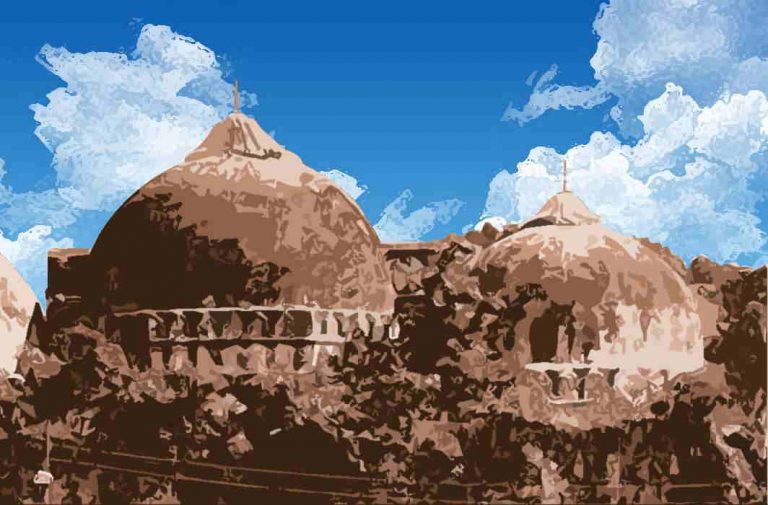
The Supreme Court on Friday (August 11) set December 5 as the day when it will start its hearings on the Ayodhya-Babri Masjid land dispute. On Friday, it was decided who would be the parties in the case and BJP MP Subramanium Swamy’s plea for being an intervener was allowed only at the end of all arguments.
The parties involved needed all the important and historical documents related to the ownership of the land at the disputed site to be translated—from the original Hindi, Pali, Sanskrit, Persian, etc. For this, they wanted four weeks, but the court allowed three months for the same and hearings will commence thereafter.
The hearings will be in front of a three-judge bench headed by Justice Dipak Misra—who by that time would have assumed the post of Chief Justice of India—and the bench will hear the batch of petitions and go through 523 exhibits in the Allahabad High Court submission.
The other members of the bench are Justices Ashok Bhushan and Abdul Nazeer. While the Allahabad High Court in 2010 had, by a 2:1 majority, said that the land be partitioned equally among three parties —the Sunni Waqf Board, the Nirmohi Akhara and Ram Lalla—more parties have been added to this, especially the Shia Central Waqf Board of Uttar Pradesh, which, on August 8, told the Supreme Court that a mosque could be built in a Muslim-dominated area at a reasonable distance from the disputed site in Ayodhya.
The Shia Board had also told the apex court in an affidavit that the Babri Masjid site was its property and only it was entitled to hold negotiations for an amicable settlement of the dispute.
Hence it had fallen on the Supreme Court for a final adjudication.
The mosque was demolished by Hindu kar sevaks on December 6, 1992 and the country witnessed massive riots, in which over 2,000 people were killed.
The Hindus claim that it is the birthplace of Lord Rama on which a mosque was built in 1528-29 CE by Mir Baqi. Since the mosque was built on orders of the Mughal emperor Babur, it was named Babri Masjid. Mir Baqi was a Shia, and it is claimed that he built the mosque for his emperor, but with his own money.
Before it was demolished in 1992, the Nirmohi Akhara had forcefully occupied the Babri Masjid in 1853 saying it was Ram Janmabhoomi.
The Shia Central Waqf Board of Uttar Pradesh has said: “Since, the Babri Masjid was a Shia Waqf, we are alone entitled to negotiate and arrive at peaceful settlement with other stakeholders.”
On Friday, while it was being decided that senior advocate AK Singh will be arguing for the State of UP, Swamy said: “I have the fundamental right under Article 25 for prohibition between the clashes, between two rights. Article 25 will prevail. Let me argue over the matter of Ram Janambhoomi.”
Advocate Rajeev Dhawan said: “The constitutionality of civil matters was not argued in the previous matter. Learned friend Swamy is not right over these.”
The lawyers argued for a while on who can argue in these matters and who cannot. There are in all 13 appeals.
Justice Misra said: “Kindly allow the appellants to finish their arguments. Court can’t go on in this chaos.”
The respondents raised the plea that many documents were filed in the high court without translation. They are in Hindi, Pali, Sanskrit, Persian, etc. The very basic thing is service of notice with all the translated documents.”
Senior advocate Kapil Sibal said: “They (respondents) are in representative character. All the office reporting is mandatory. Give us the list of all those documents which need to be translated. Appellants can’t start arguments like this. All those who are dead, their substitution is to be done by the appellants.”
Justice Misra said: “LRS of the dead (respondents) are to be represented for notices. First three matters 301.1, 301.2 and 301.3 are PILs; the court is not considering them. Where the respondents are dead and they have LRS, let the LRS to be subsisted by the substitution application.”
Meanwhile, Swamy’s plea is not admitted by the court.
Justice Misra said: “The exhibit parts which are on the instance of defendants have to be translated by them.”
When Sibal said they need four months for translation, the judge asked: “What were you doing for seven years?”
Justice Bhushan said: “We will take care of service and translation and will give reasonable time.”
Swamy, meanwhile, requested the court to grant him intervening opportunity to get heard.
Justice Bhushan said: “We will give you opportunity after all the parties are heard.”
—India Legal Bureau

